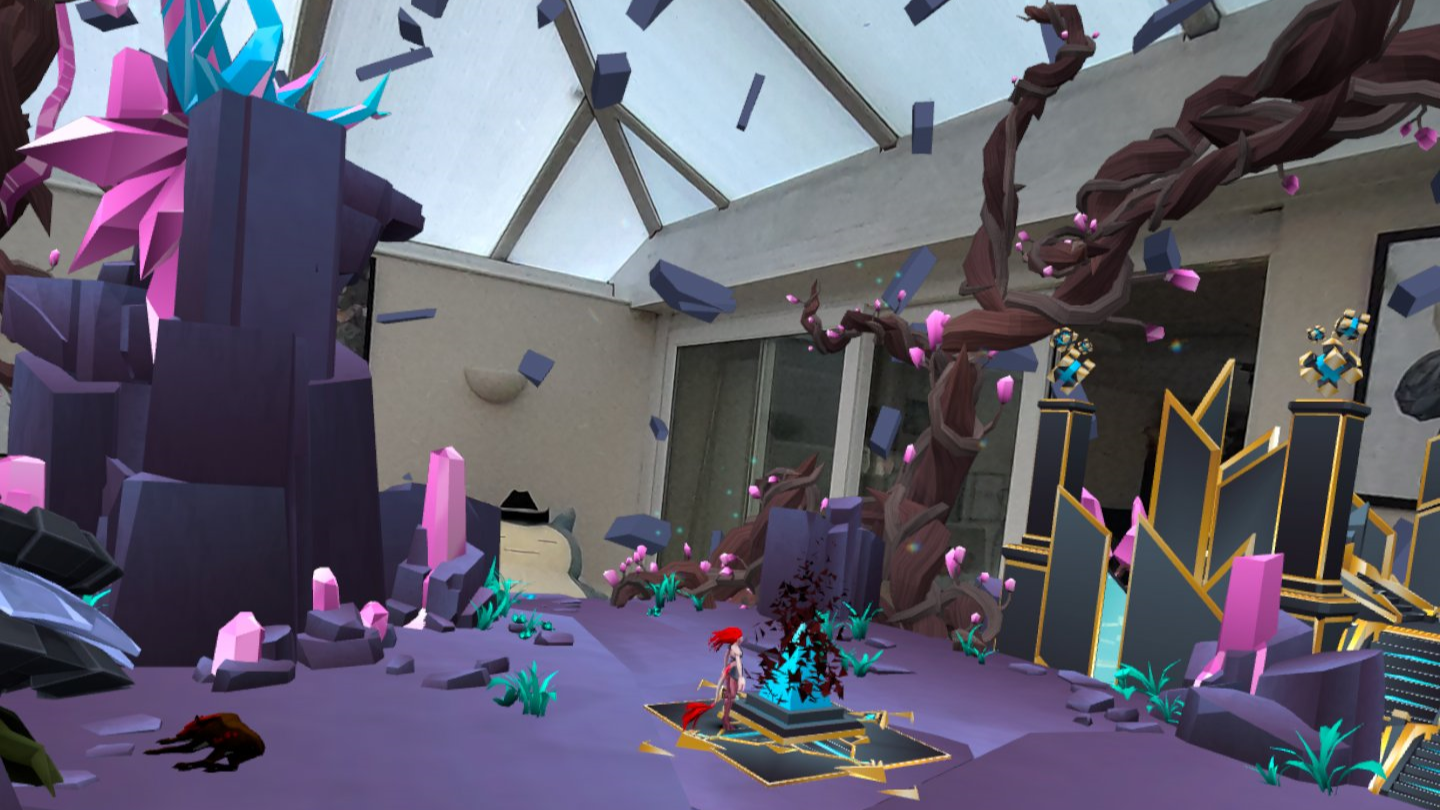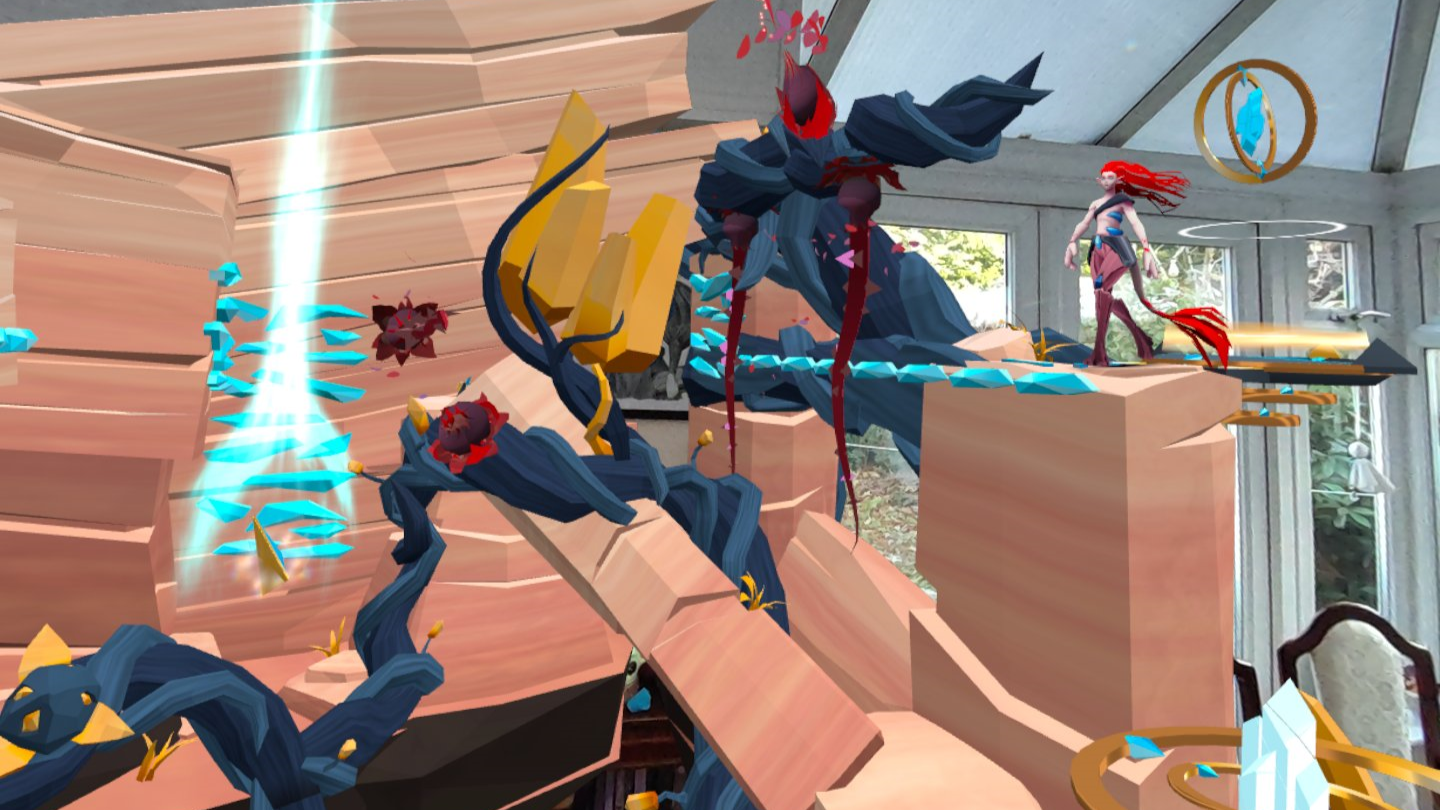Demeter: The Asklepios Chronicles makes an interesting case for mixed reality platformers, though the execution falls short. Read on for our full review:
I didn’t believe platformers would work in VR before 2018. When immersion is VR’s biggest strength, third-person gameplay doesn’t seem like a great fit in theory, yet Moss and Astro Bot: Rescue Mission proved that wrong. What’s followed since 2018 hasn’t been as exciting beyond No More Rainbows. Ven VR Adventure was middling and Moss: Book 2, an exemplary sequel in its own right, was very similar to the first. By using mixed reality rather than fully immersive environments, Demeter intrigued me.
Much like Moss, Astro Bot and Ven, you aren’t directly embodying the main protagonist, Atalanta. As a third-person platformer, you instead play as the ‘Pilot,’ a silent entity who watches while controlling her movement through the Touch Controllers. After crash landing inside your real-world home, we’re tasked with helping Atalanta return to her home planet and a campaign split between multiple chapters follows.
Demeter recommends a 3.5m x 3.5m area and uses procedurally generated levels based on either a pre-existing Guardian or fresh room capture. Novelab doesn’t recommend the former and when I tried a pre-existing Guardian, I found levels spawning considerably far from my play space. Thankfully, pressing the Y button for ‘Accessibility’ mode negates this concern, letting you move levels wherever you’d like.
When levels are in an accessible position, I appreciate how Demeter’s world interacts with your home environment, like a virtual diorama in living space. Walking around my living room to check each level for collectibles, like the shards required for your ship, adds a new perspective and freedom I particularly enjoyed.

However, that initial joy soon wears off as Demeter’s core platforming mechanics just aren’t that exciting. Atalanta’s moves consist of basic actions like jumping, climbing, and dashing to get through environmental hazards or avoid enemies, plus a basic attack that’s charged by holding down B. It’s enjoyable but not particularly thrilling, which isn’t helped by the limited enemy variety.
Demeter’s most interesting gameplay aspect is Orb Powers, two unlockable abilities. The Prismalight reveals ethereal blue entities like platforms or ledges, yet those only remain “solid” while the light shines upon them. Demeter uses this as a clever means of navigating your way through traps. I also enjoyed the odd fight that involved shining this on enemies before you can attack. Both add some much-needed challenge to this adventure. Your other power, Magnetism, is more straightforward but still useful, letting you manipulate stage layouts by moving platforms along a pre-determined path.
Demeter: The Asklepios Chronicles doesn’t have any comfort settings, though I found it a completely comfortable experience in mixed reality. Beyond a few accessibility settings for subtitle font sizes and font color, alongside changing background colour and the background opacity, there’s nothing else worth noting.

Demeter’s story is what kept me going until the end. Atalanta’s clearly going through grief and that’s coupled with decent world-building. Lore crystals outlining the previous civilization’s history weren’t especially engaging, yet I’d carefully listening to the collectible log records from a missing pilot that reveal what happened.
Demeter: The Asklepios Chronicles Review – Final Thoughts
Demeter: The Asklepios Chronicles feels like a promising concept working off the VR platformers that came before. It takes clear inspiration from Moss and Astro Bot while delivering its own mixed-reality twist that makes you feel like a more present observer in this world. Demeter isn’t the most exciting experience, though, because of some occasionally dull gameplay, but if you’re seeking another platformer for your headset, there’s enough here to keep you invested.

UploadVR uses a 5-Star rating system for our game reviews – you can read a breakdown of each star rating in our review guidelines.
- SEO Powered Content & PR Distribution. Get Amplified Today.
- PlatoData.Network Vertical Generative Ai. Empower Yourself. Access Here.
- PlatoAiStream. Web3 Intelligence. Knowledge Amplified. Access Here.
- PlatoESG. Carbon, CleanTech, Energy, Environment, Solar, Waste Management. Access Here.
- PlatoHealth. Biotech and Clinical Trials Intelligence. Access Here.
- Source: https://www.uploadvr.com/demeter-the-asklepios-chronicles-review/
- :is
- :not
- 200
- 2018
- 32
- 7
- 9
- a
- abilities
- accessibility
- accessible
- actions
- add
- Adds
- Adventure
- After
- along
- alongside
- also
- an
- Ancient
- and
- Another
- any
- appreciate
- ARE
- AREA
- around
- AS
- aspect
- attack
- avoid
- background
- based
- basic
- because
- been
- before
- believe
- between
- Beyond
- Biggest
- Blue
- book
- Bot
- both
- Breakdown
- but
- button
- by
- came
- Campaign
- CAN
- capture
- carefully
- case
- challenge
- changing
- chapters
- charged
- check
- Chronicle
- Civilization
- clear
- clearly
- Climbing
- Close
- Collectible
- collectibles
- color
- COM
- comfort
- comfortable
- completely
- concept
- Concern
- content
- controlling
- Core
- coupled
- Crash
- Date
- delivering
- didn
- directly
- doesn
- down
- each
- either
- else
- embedded
- embodying
- end
- enemies
- engaging
- enjoyable
- enough
- entities
- entity
- Environment
- environmental
- environments
- especially
- ethereal
- exciting
- execution
- experience
- Falls
- far
- feel
- feels
- few
- fight
- final
- First
- fit
- followed
- follows
- For
- Former
- found
- Freedom
- fresh
- from
- full
- fully
- game
- gameplay
- generated
- get
- going
- great
- greek
- guardian
- happened
- Have
- Headset
- helped
- helping
- her
- here
- history
- holding
- Home
- How
- HTTPS
- i
- if
- immersion
- immersive
- in
- initial
- inside
- Inspiration
- instead
- interacts
- interesting
- invested
- involved
- isn
- IT
- ITS
- joy
- just
- Keep
- kept
- landing
- letting
- Level
- levels
- light
- like
- Limited
- Listening
- living
- log
- Magnetism
- Main
- MAKES
- me
- means
- mechanics
- Meta
- Meta Quest
- missing
- mixed
- mixed reality
- Mode
- more
- moss
- most
- move
- movement
- moves
- moving
- much-needed
- multiple
- my
- navigating
- New
- nothing
- noting
- of
- off
- on
- only
- or
- Other
- our
- outlining
- own
- particularly
- path
- perspective
- pilot
- planet
- platform
- Platforms
- plato
- Plato Data Intelligence
- PlatoData
- Play
- played
- plus
- position
- power
- powers
- pre-order
- present
- pressing
- previous
- promising
- proved
- quest
- quest 3
- rather
- rating
- RE
- Read
- real world
- Reality
- recommend
- recommends
- records
- remain
- required
- rescue
- return
- reveal
- Reveals
- review
- Reviews
- right
- Room
- s
- seeking
- seem
- settings
- shines
- shining
- SHIP
- Short
- similar
- since
- sizes
- solid
- some
- soon
- Space
- split
- Stage
- Star
- Still
- Story
- straightforward
- strength
- system
- takes
- than
- Thankfully
- that
- The
- Them
- theory
- There.
- this
- those
- though?
- thrilling
- Through
- to
- touch
- trailer
- traps
- tried
- twist
- two
- until
- UploadVR
- upon
- useful
- uses
- using
- variety
- very
- Virtual
- vr
- walking
- was
- watches
- Way..
- we
- weren
- What
- when
- which
- while
- WHO
- with
- Work
- working
- world
- worth
- would
- Wrong
- X
- yet
- You
- Your
- youtube
- zephyrnet













